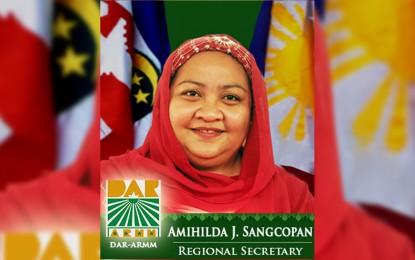
Re-elected AMIN party-list Rep. Amihilda Sangcopan.
MANILA -- The current and former representatives of the Anak Mindanao (AMIN) party-list group on Tuesday hailed the passage of a proposed measure authorizing the establishment of Islamic banks in the country, saying the enactment of the measure will greatly help the Philippine economy as it pursues financial inclusion for Filipino Muslims in the Bangsamoro region.
Reelected AMIN Rep. Amihilda Sangcopan said House Bill 8281, or “An Act Providing for the Regulation and Organization of Islamic Banks,” is set to be transmitted to Malacañang for President Rodrigo Duterte’s signature after the Senate adopted the measure.
Sangcopan said once enacted into law, the measure will attract more investments in the country’s banking sector and complement the newly-created Bangsamoro Organic Law (BOL).
“This is good news as we celebrate Eid’l Fitr tomorrow (Wednesday). This will help Filipino Muslim businessmen to have access to banking and financial services that are attuned to the principles of Shari’ah or Islamic law,” she said.
HB 8281 refers to an Islamic bank as a business whose objectives and operations do not involve interest (riba), which is prohibited by the Shari’ah and which conducts its business transactions in accordance to Shari’ah principles.
Sangcopan said the House of Representatives welcomed the Senate’s adoption of its version, dispensing the need for a bicameral conference committee.
“With the imminent passage of this measure into law, Laos will be the remaining country in the ASEAN region which has no Islamic banking system,” she said.
Meanwhile, former AMIN Rep. Sitti Djalia Turabin-Hataman, the principal author of HB 8281, thanked the senators, led by Sen. Francis Escudero who sponsored the measure in the Senate, for adopting the House version without amendments.
Turabin-Hataman stepped down from her post last October 2017 after filing the measure to return to community service, and was replaced by Sangcopan.
“I thank my colleagues for the passage of this measure. Congratulations everyone! No words are enough. Prayers are all I can utter,” she said.
The incoming mayor of Isabela City in Basilan said the measure will support the mandate of the Bangsamoro government to promote and develop the Islamic banking and financial system in the country.
She added that the passage of the measure will encourage the influx of more investments from Islamic investors in the Middle East and other parts of the world.
“We’d like to invite everyone, Muslim and non-Muslims, to take a closer look at Islamic banking as an alternative-financing modality, instrument and facility,” she said.
“This is very good for the economy, considering the enormous potentials of the halal industry. As we enter the ASEAN integration, we need to attain financial inclusion for the Muslims in the country,” Turabin-Hataman said.
HB 8281 seeks to regulate and organize Islamic banks by mandating the Bangko Sentral ng Pilipinas (BSP) to supervise, license and regulate the operations of Islamic banks like universal banks.
Aside from authorizing the establishment of Islamic banks, it also allows conventional banks to engage in Islamic banking arrangements -- including structures and transactions, through a designated Islamic banking unit within the bank -- provided that the Islamic banking unit is separate from its conventional banking transactions.
The Monetary Board may also authorize a foreign Islamic bank to establish banking operations in the Philippines under any of the modes of entry provided under Republic Act 7721 or "An Act Liberalizing the Entry and Scope of Operations of Foreign Banks in the Philippines and for Other Purposes", as amended.
Islamic banks may perform the following services: accept saving accounts for safekeeping or custody with no participation in profit and loss except unless otherwise authorized by the account holders to be invested; act as correspondent of banks and institutions to handle remittances or any fund transfers; accept drafts and issue letters of credit or letters of guarantee, negotiate notes and bills of exchange and other evidence of indebtedness; provide financing with or without collateral by way of leasing, sale and leaseback, cost-plus profit sales arrangements, and other Shari’ah compliant financing contracts and structures; and other banking services as may be authorized by the Monetary Board.
Islamic banks created under the Act shall comply and conform with pertinent laws, rules, and regulations applicable to private corporation engaged in banking, such as the Corporation Code of the Philippines, and the requirements of the respective regulatory agencies.
It shall also be the responsibility of an Islamic bank to ensure its compliance with Shari’ah principles.
An Islamic bank shall also constitute its Shari’ah advisory council composed of persons who are qualified in the Shari’ah or who have knowledge or experience in Shari’ah banking, finance, law or such other related disciplines. (PNA)
